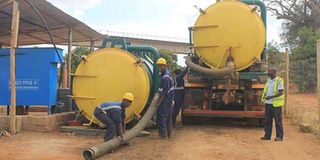How the fuel racket works at Kenya Pipeline Company

EnvironServ workers. The company was contracted by KPC to clean oil that spilled inThange River in Kibwezi, Makueni County. Three years later, the effects of the spillage can still be seen. PHOTO | FILE | NATION MEDIA GROUP
What you need to know:
- But for the last two years, KPC claims that it had lost 8 million litres through spillage.
- There has neither been any reports of environmental crisis nor were funds set aside to clean up the mess.
- Some of these losses exist on books and are part of a choreographed theft of fuel at KPC.
When 400,000 litres of oil spilled in Thange Valley in Makueni in 2015, there was a national uproar and demands for compensation from the affected community.
The Kenya Pipeline Company even awarded a multimillion-shilling contract to EnviroServ to clean up the mess.
Three years later, the effects of the spillage can still be seen.
But for the last two years, KPC claims that it had lost 8 million litres through spillage – and yet there has neither been any reports of environmental crisis nor were funds set aside to clean up the mess. Reason: some of these losses exist on books and are part of a choreographed theft of fuel at KPC.
“There was no spillage worth talking about,” a senior official at KPC told us about a fact known internally.
A board member, who sought anonymity because of the sensitivity of the issue, said that the matter has never been brought to the attention of the board.
LOSS
“We heard it for the first time in July when the management wrote to oil marketing companies notifying them of the loss,” said the board member.
“There is no way such a spillage could have escaped even the media attention. No way!”
How 8 million litres could spill without raising any environmental alarm has also baffled the industry with fingers pointed at the KPC management which, despite lack of evidence on the ground, insists that they had lost such a humongous amount of fuel.
The only major spillage on record was at the Thange River and so far KPC has spent Sh30 million on Corporate Social Responsibility activities and Sh200 million to clean up the soil and water sources.
“If Thange River, with 400,000 litres spilled resulted in all these activity, why haven’t we seen the same in Ngong Forest where the company claims to have lost 1.2 million litres?” asks the board member.
“Did we file reports with Nema (National Environment Management Authority) and what did our reports say?”
In Thange the KPC insurers paid for the loss and the environmental damage. Insiders say that claims are still being processed.
NOT ADDING UP
But it appears that the reported spillage of 8 million litres and siphoning of 4.4 million litres has not moved the insurers and the oil marketing companies (OMC) who feel that the numbers are not adding up – and there is no evidence on the ground either.
A senior manager with KPC told the Nation that shortly after the OMCs said they would like to carry forensic audit, the KPC Managing Director Joe Sang wrote “an advance warning” note to the board.
The fear is that the forensic audit will expose pilferage and theft that has been disguised as spillage.
KPC had asked the OMC to cover the loss, although this ought to have been covered under the gain/loss provision of 0.25 per cent.
Under this provision, the industry agrees to a loss of 25 litres for every 10,000 litres that passes through the pipeline.
RACKETEERS
But most of these fuel is sold to racketeers since KPC operates a closed pipe and chances of such loss are minimised.
And with KPC pipeline handling more than 2.5 billion litres of fuel a year– that means that the buccaneers can comfortably declare 6.2 million litres as loss.
While this ought to be shared by the industry, or the gains passed on to consumers, it is normally sold in the black market.
“The 0.25 per cent provision is the industry’s cash cow,” an insider tells us.
This “pipeline losses” is later passed on to the oil marketers who are eventually compensated through a formula approved by the Energy Regulatory Board where consumers are charged at the petrol stations.
More so, the stolen fuel is sold at the black market and is used to undercut the legitimate dealers and sometimes support the adulteration cartel that mixes diesel or petrol with kerosene.
Interestingly, the 0.25 per cent provision is legal and exists in the contractual agreement between the oil marketing companies and KPC.





